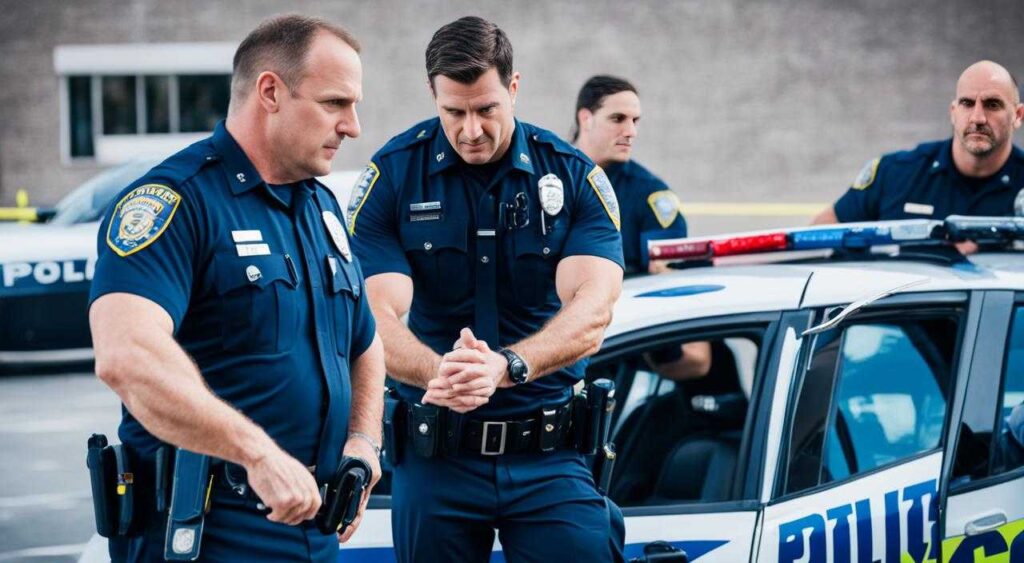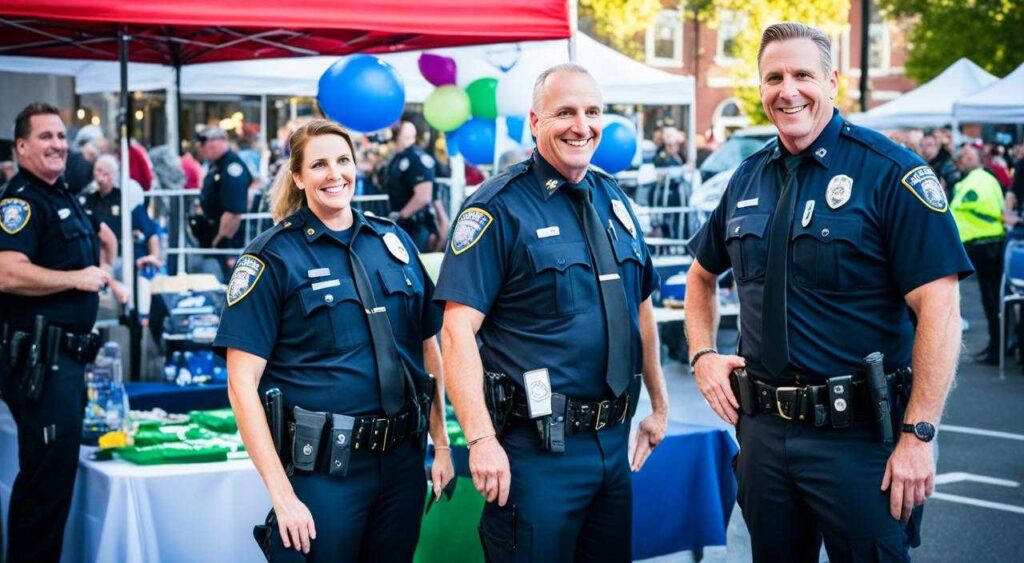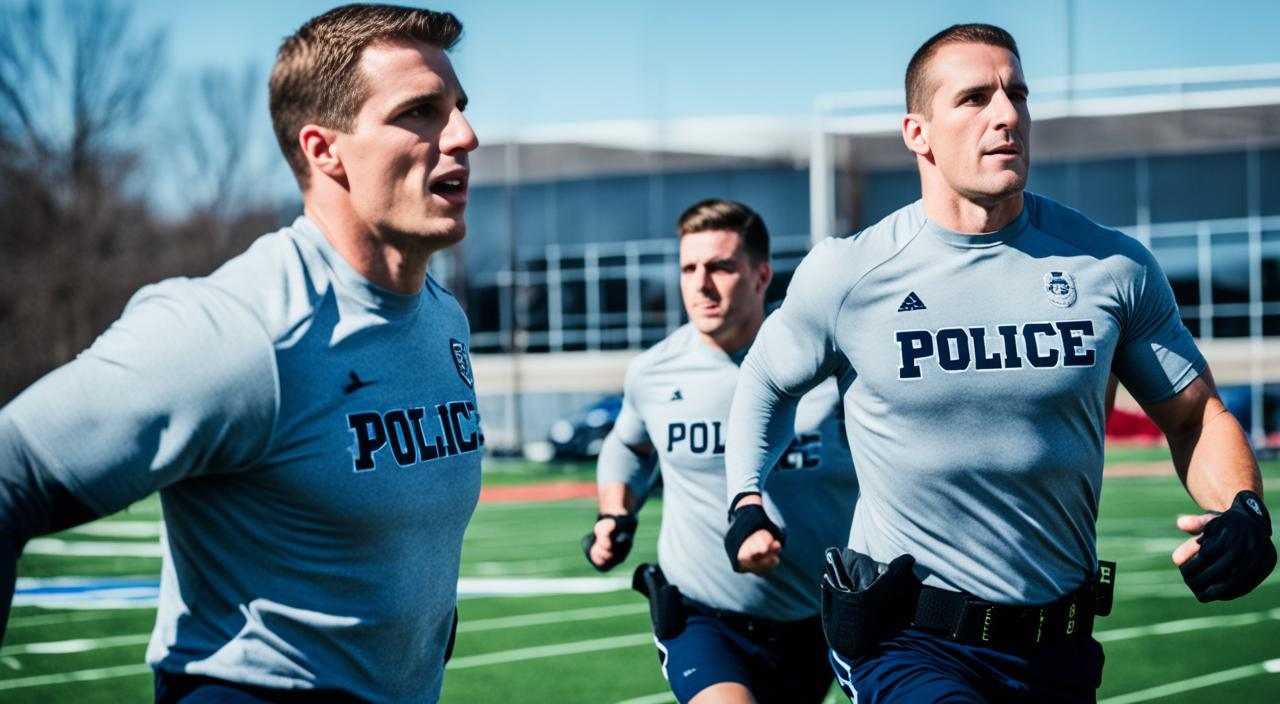Do you know, that not all police officers start by going to college? If you want to serve and protect, you can become a police officer without a degree. You just need to meet some eligibility requirements. Even if you haven’t been to university, you can still have a law enforcement career. This is thanks to training programs that focus on skills and courage.
Key Takeaways
- You don’t need a four-year degree to be a police officer, but you must meet certain criteria.
- These requirements usually include some schooling, being old enough, and being fit.
- Knowing about law enforcement and wanting to help your community can make up for not having a degree.
- Police academies train you well for a career in law enforcement.
- Having no criminal record and passing entrance tests are key steps in getting hired.
- Qualities like honesty, talking well with others, and solving problems are important for police work.
- Having served in the military or worked in a similar field can improve your chances.
Understanding Eligibility Requirements
To become a police officer, you must meet specific eligibility criteria. These requirements make sure candidates are ready for the profession’s demands. Knowing these rules helps future officers start their law enforcement careers.
Minimum Education and Age Criteria
Most times, a college degree isn’t needed. But, all candidates need to have a certain level of education. The basic police officer qualifications usually ask for a high school diploma or GED. Age needs differ by state or department, but you must be 18 to 21 years old to apply.
Citizenship and Driver’s License Necessities
You must be a U.S. citizen to apply. This is a critical eligibility criterion for the job. Also, having a valid driver’s license is essential. Officers often use vehicles to patrol and must get to incidents quickly and safely.
Criminal Record and Law Enforcement Entrance Exam
Having a clean criminal record is key to maintaining trust and integrity. Also, the law enforcement entrance exam is a major step in the hiring process. This test checks a wide range of skills. They include critical thinking, problem-solving, communication, and physical fitness.
| Qualification Aspect | Description | Why It’s Important |
|---|---|---|
| Education Level | High School Diploma or GED | Ensures candidates have foundational academic skills |
| Age Requirement | Typically 18-21 years, may vary | Confirms legal and developmental maturity for the role |
| Citizenship | Must be a U.S. Citizen | Upholds legal and regulatory standards for public service positions |
| Driver’s License | Valid and unrestricted | Essential for patrolling and responding to calls |
| Criminal Record | Absence of felony convictions | Maintains integrity and public trust in the police force |
| Entrance Exam | Written and physical assessments | Evaluates readiness and aptitude for law enforcement duties |

How to become a police officer without a degree
Getting into law enforcement doesn’t always mean you need a four-year degree. Other paths lead to a career as a police officer. Below, we discuss how to become a police officer without a traditional college education.
- Meet the Minimum Requirements: Make sure you’re the right age and a citizen before you apply to a police department.
- Obtain a High School Diploma or GED: Most police jobs ask for at least a high school diploma or GED.
- Consider a Certificate in Law Enforcement: Even if it’s not a degree, learning through a certificate program can be helpful.
- Go Through a Background Check: Having no criminal record and good credit is important.
- Pass Physical and Mental Health Exams: These exams make sure you’re ready for the physical and mental challenges of the job.
- Complete Police Academy Training: Finishing police academy training is a must to become a police officer.
- Gain Experience: Volunteering or working in related jobs like security can make your application stronger.
- Prepare for and Pass the Law Enforcement Entrance Exam: Reviewing the needed knowledge and skills is crucial to pass this exam.
The steps outlined show that building a career in law enforcement is possible with hard work and taking alternate routes. Constant learning and training are key to moving forward in your career.
Getting to wear the uniform proudly might not follow the usual path for everyone. Yet, sticking to the required standards and being determined can lead to a rewarding job in law enforcement. With dedication and the right approach, you can protect and serve your community.
Preparing for a Career in Law Enforcement
Starting a career in law enforcement is a noble aim. It takes dedication and thorough preparation. Candidates must show they are physically fit and also master vital police academy training skills. Let’s look at what you need to succeed in this career.
Physical Fitness and Police Academy Rigor
Being physically fit is key in law enforcement. Physical fitness requirements are crucial for the selection. They ensure officers can meet the job’s physical demands. This includes chasing suspects and keeping people safe.
Law Enforcement Training and Skills Acquisition
Police academy training is tough but essential. It teaches both theory and practical skills. Recruits learn everything from defense tactics to legal knowledge. This training prepares them well for their duties.
Valuable Personal Attributes for Police Work
Some personal traits are vital for success in law enforcement. Integrity, empathy, and good judgment are key. These essential skills for police officers are developed through time and real-life experiences.
| Category | Physical Fitness Requirements | Police Academy Training | Essential Personal Skills |
|---|---|---|---|
| Core Focus | Endurance, Strength, Agility | Law Procedures, Defensive Tactics | Integrity, Communication, Resilience |
| Evaluation Methods | Fitness Tests, Simulations | Exams, Field Exercises | Psychological Assesment, Peer Review |
| Improvement Strategies | Regular Workouts, Dietary Plans | Study Groups, Scenario Training | Mentoring, Community Engagement |
Preparing for a career in law enforcement covers many areas. It’s about physical, academic, and personal growth. This journey is tough but very rewarding. It takes physical fitness requirements, in-depth police academy training, and building essential skills for police officers.

Highlighting Equivalent Experience and Skills
Wanting to be a police officer without the usual school background is okay. You can bring other valuable experiences to the job. It’s key to identify alternative qualifications for police officer positions. Having military experience or various transferable skills from other jobs can set you apart. These experiences can give you a unique edge in the law enforcement field.
Military Service as a Competitive Edge
Being a veteran is a big plus in law enforcement. Vets have discipline, leadership skills, and understand how to follow protocols. These are all important in police work. They also know about planning, assessing risks, and responding to emergencies. Such military experience makes a candidate stand out when applying for police roles.
Emphasize Transferable Skills from Other Jobs
If you don’t have a college degree, showing your skills from past jobs is crucial. Being good at talking to people, solving problems, handling conflicts, and working in a team are valuable. These abilities are just what a career in law enforcement needs. Talk about your work history and show you can adapt and do well in a police department.
The Role of Volunteer Work in Demonstrating Commitment
Doing volunteer work shows you care about your community. This is a big part of being a police officer. Helping with community programs or local safety groups shows your interest in public safety. This might not be a formal experience, but it shows your good character. It shows you’re ready to handle the duties of a police officer.
Strategic Career Building and Networking
Starting a career in law enforcement means growing professionally and taking personal steps. It’s important to understand the field and take advantage of networking for police officers. This part talks about how officers can improve their careers through smart strategies.
Starting in Smaller Forces and the Path to Advancement
Many officers start in small agencies, where they gain hands-on experience and community connections. These places help officers move up in their careers. To move forward, officers should follow these steps:
- Excelling in roles that may lead to increased responsibility
- Regularly undergoing additional training and certifications
- Proactively seeking leadership positions when available
These steps are crucial for moving up in your career, both in the beginning and later on.
Seeking Mentorship and Garnering Recommendations
Finding mentors and supporters is key. Experienced officers can offer advice, support, and insight into career advancement. These relationships can lead to strong recommendations. To build these connections, officers should:
- Identifying superiors or experienced officers who exemplify excellence
- Requesting formal or informal mentorship arrangements
- Gaining visibility within the department by taking the initiative
Engagement in Community Events for Visibility
Community engagement builds trust and boosts an officer’s reputation. Being active in events shows dedication and opens networking opportunities. Officers can become more visible by:
- Volunteering for community outreach programs and public safety events
- Interacting with community leaders and organizations
- Participating in local initiatives and providing support where needed
Being an active community member helps officers make a positive, long-lasting impression on both colleagues and locals.
| Action | Benefits | Examples |
|---|---|---|
| Join smaller law enforcement agencies | Gain diverse experience, build a solid foundation for career growth | Rural police departments, township law enforcement |
| Seek mentorship | Acquire industry insights, receive career guidance | Connecting with senior officers, attending professional workshops |
| Community participation | Improve public relations, expand professional network | Neighborhood watch programs, safety fairs |
Conclusion
Becoming a police officer without a degree is possible for those ready to serve. The path is tough and needs a lot of dedication. Following the steps and advice we’ve shared can help you succeed in law enforcement.
Your ability to adapt, prepare well, and aim to improve public safety is crucial. If you have experience from the military or other relevant fields, it can help a lot. Being involved in your community can also strengthen your application.
You can truly pursue a career in law enforcement without a college degree. This guide aims to show you how to achieve this. Taking up this noble profession lets you make a big difference in society. It allows you to protect and enhance our communities.
You may like:
- How to become a pilot without a degree
- How to become a recruiter without a degree
- How to become a certified counselor without a degree
- How to become a virtual assistant without a degree
- How to become a childcare worker without a degree
FAQ
What are the eligibility requirements to become a police officer without a degree?
To be a police officer without a degree, you need to meet some basics. You should be the right age, a citizen, and have a driver’s license. Also, a clean criminal background is necessary, along with passing a police exam.
What steps do I need to take to become a police officer without a degree?
Becoming a police officer without a degree involves different steps. You can join training programs or get law enforcement certifications. These steps open the door to a rewarding law enforcement career.
What should I do to prepare for a career in law enforcement?
Getting ready for a law enforcement career means being physically fit and going through police academy training. You also need to learn key policing skills. Preparing in these ways helps you succeed in this field.
Can I become a police officer without a degree if I have equivalent experience and skills?
Yes, having certain experiences and skills can help you become a police officer without a degree. Experience in the military gives you an edge. Skills from other jobs and volunteer work show your dedication to law enforcement.
How can I strategically build my career and network in law enforcement?
To build a career in law enforcement, start by planning and networking. Begin in smaller forces and look for chances to move up. Seek advice and help from mentors, and be seen at community events. These steps are key to moving forward.
Source Links
- https://work.chron.com/become-police-officer-degree-16418.html
- https://www.quora.com/Can-someone-become-a-police-officer-without-a-college-or-university-degree-Is-there-a-disadvantage-for-those-without-a-degree-in-becoming-a-police-officer
- https://www.zippia.com/answers/how-to-become-a-police-officer-without-a-college-degree/
